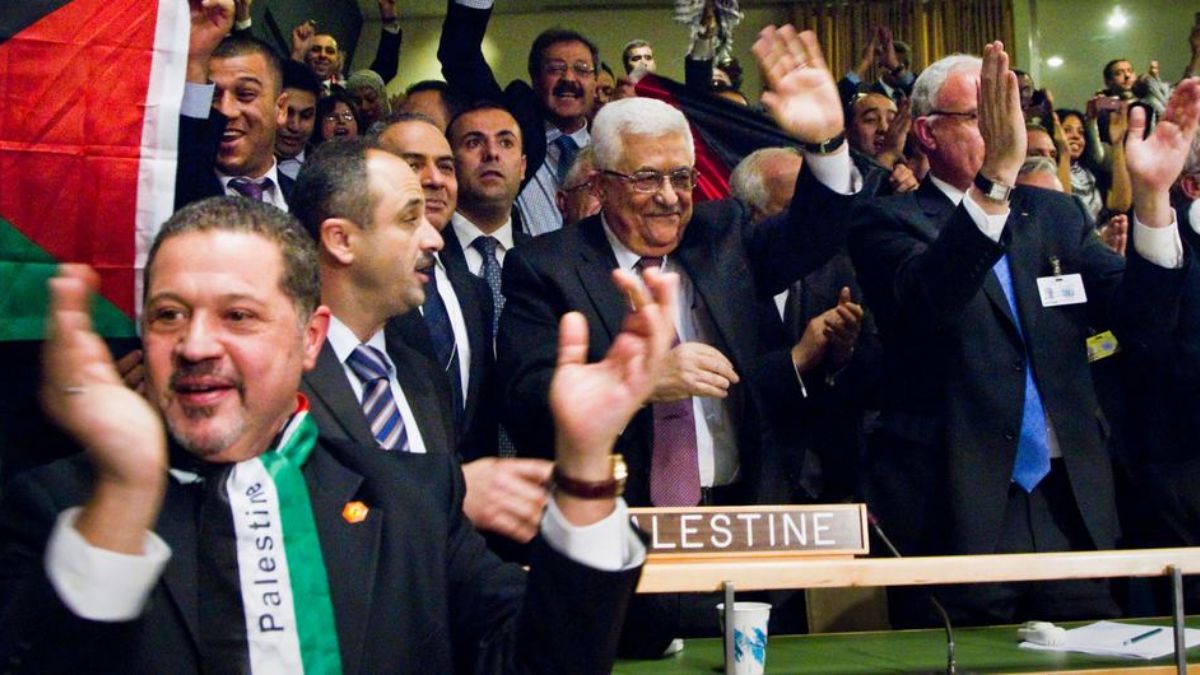The UN General As sembly voted overwhelmingly on Friday to back a resolution that supports enhanced status for the Palestinian mission but stops short of granting full UN membership. As many as 143 nations, including India, voted in favor of the resolution. Among the nine that voted against it were the US and Israel. There were 25 abstentions. This is a significant push for Palestinian statehood and highlights Israel’s isolation amid ongoing conflict in Gaza.
What is the current status of Palestine in the UN? Why have past attempts to get full membership for Palestine failed? What does the new resolution say? We explain.
Palestine’s current status at the UN
The resolution does not confer full membership or voting rights within the General Assembly to Palestine, nor does it allow the state to seek a position on the UN Security Council. However, it grants Palestinian diplomats new privileges, including the ability to sit in the UN General Assembly in alphabetical order, introduce proposals and amendments, speak on Middle Eastern issues, and make statements on behalf of nation groups.
The State of Palestine is currently recognised as a non-member observer state by the UN. That happened in 2012, the General Assembly voted overwhelmingly to upgrade Palestine’s status from an “entity” to a “non-member observer state.” This status change has allowed Palestine to join international organisationss and treaties, such as the International Criminal Court, and has symbolically bolstered its quest for statehood on the global stage.
Impact Shorts
More ShortsThe decision also allowed Palestinians to join other international organisations, including the International Court of Justice (ICJ). The apex court of the UN is currently considering the legality of Israel’s “occupation, settlement and annexation” of Palestinian territory, as well as a separate case alleging that Israel is violating the Genocide Convention in its war against Hamas in Gaza
The bid for UN membership
Palestine has been striving for full UN membership for over a decade. Palestinian President Mahmoud Abbas first submitted an application for UN membership in 2011. However, the bid did not secure enough support from the UNSC due primarily to opposition from some of its permanent members, particularly the United States.
The latest push for full membership comes at a time of the ongoing conflict and thousands of casualties in Gaza.
Why the resolution is a big deal
The language of the draft resolution is a big deal. The resolution has called for a concerted international effort to end the Israeli occupation that began in 1967. It was in 1967 that Israel captured territories like the West Bank, East Jerusalem, and the Gaza Strip. This point in the resolution, in simple words, reiterates that the Palestinian state comprise these territories.
The resolution, referencing the 1948 advisory opinion of the International Court of Justice and Article 4 of the UN Charter, recommended that the UNSC reconsider the matter of its full membership favourably. This is important as an application to become a full member with voting rights would have to be approved by the UNSC.
Trita Parsi, Executive Vice-president of Quincy Institute, and American think tank, in a LinkedIn post wrote that the resolution “appears to grant Palestine the full rights and privileges of a member EVEN if the UNSC fails to admit Palestine.” This would be an unprecedented decision designed to bypass US President Joe Biden’s veto at the UNSC. For context, Biden had, in April, vetoed a draft resolution at the UNSC which recommended granting the State of Palestine full membership in the UN.
The modified draft resolution says that the bypassing of the UNSC is done ‘on an exceptional basis and without setting a precedent.’ This is likely a move to alleviate concerns that China and Russia, Palestine’s supporters in the UNSC, have regarding states such as Taiwan or Kosovo using this to get full membership.
This resolution is also carefully crafted to avoid triggering a cutoff of US funding under a 1990 law. The overwhelming support for the resolution in the UNSC in light of the conflict and humanitarian crisis in Gaza, shows how isolated Israel and the US are in their positions at the UN.
The chances of Palestine getting full membership
The hurdle is the UNSC. To become a full member of the UN, a state must first receive a recommendation for admission from the UNSC, where approval requires at least nine affirmative votes and no vetoes from any of the five permanent members. The US has consistently opposed unilateral moves to full membership, advocating instead for a negotiated peace agreement with Israel as the pathway to resolving the status of Palestine.
Reaction from US, Israel
The US mission to the UN, which voted against the measure, reiterated that despite the resolution’s passage, it does not change the Palestinian Authority’s status as a “non-member state observer mission.” The mission’s spokesperson, Nathan Evans, stated that the resolution does not meet the criteria for U.N. membership set by the UN charter. The US also warned that it would veto any further efforts to obtain full membership for Palestine if brought before the UNSC.
In a dramatic protest at the UNGA, Israel’s Ambassador Gilad Erdan tore up a copy of the UN Charter following the passage of a resolution endorsing Palestine’s full membership in the organization. Erdan condemned the resolution as a “clear violation” of the Charter and an attempt to bypass a recent US veto in the Security Council concerning the same issue.
“This day will go down in infamy,” Erdan stated, as he ripped the document in front of the assembly. He accused member states of “shredding the UN Charter with your own hands” through their support of the vote, describing it as an “immoral act.”
The resolution, which was notably supported by India among others, aims to elevate Palestine’s status at the UN and has reignited tensions over the long-standing Israeli-Palestinian conflict at the international level.
With inputs from agencies
)